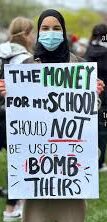BY CLINT COMBS
On May 10 student activists supporting Palestinian rights packed a sixth-floor room at McNamara Hall urging the University of Minnesota’s Board of Regents to cut business ties with defense contractors.
“The global nature of these corporations and the harm they are complicit in means that a wide range of students are impacted,” said Gracelyn McClure of Students for Climate Justice at the University of Minnesota and one of four leaders of the Divest Coalition. “No student should have to grapple with the fact that the university they attend is invested in the suffering of their own people.”
A collective group of student chapter organizations – Students for Climate Justice (UMN Climate Justice); Students for a Democratic Society (SDS); Students for Justice in Palestine (SJP); and Young Democratic Socialists of America (YDSA) – make up the UMN Divest Coalition. Protests have roiled campuses nationwide as supporters of Palestinian rights set up encampments. Activists want universities to withdraw their endowments from companies linked to Israel.
“Such investments imply the university’s finances amount to direct complicity in war crimes and human rights violations worldwide,” Fae Hodges of SDS told the Board of Regents. “These investments are clearly not in line with the university’s guiding principles which claim to create an environment that ‘embodies the values of academic freedom, responsibility, integrity and cooperation.’”
Mohammed, a member of SJP and leader of the UMN Divest Coalition who only shared his first name for fear of retaliation and doxing, outlined specific policy proposals to the Board of Regents.

Northrup Mall (Photo/Racket)
“We demand that a vote be taken by the Board of Regents to direct the Office of Investments and Banking to divest the University of Minnesota endowment from all companies that consistently, knowingly and directly facilitate and enable human rights violations, war crimes and violation of international law,” Mohammed said.
The University of Minnesota agreed to reveal its investments in publicly traded companies that do business with Israel in exchange for students to stop their encampment. The University of Minnesota has an endowment worth $2.27 billion.
Encampments started on Northrop Mall on April 24. University of Minnesota police arrived at the encampment on the north end of Northrop Mall, ordering demonstrators to disperse by 7 a.m. Nine protesters were arrested.
Jasper Nordin, a history major who was arrested, remembered April 24. “UMPD showed up and they were like you guys got to clear out of here in a half hour or else we’ll start making arrests,” he said. “I and eight others were like ‘well we said we’ll occupy this area until the university met our demands or until they removed us by force.’”
Also arrested on April 24 were Sasmit Rahman, a psychology major at the university, and Mira Altobell-Resendez, a staff member with the U of M’s Disability Resource Center who was working as a security marshal at the protest. The officer who arrested Rahman and Altobell-Resendez wrote in police documents that: “Subjects refused, and instead of leaving the area, they formed a human circle, interlocking hands and shouting songs about freeing Palestine and insulting the University of Minnesota staff as well as the University Police Department.” The police narratives were part of documents released under Minnesota’s Government Data Practices Act.
While UMPD booked nine people, subsequently banning them from campus and charging them with trespassing, students began to organize two rallies that day: a rally at the Hennepin County Jail at mid-morning on April 23 to support the arrested students, and a 2 p.m. walkout rally in front of Coffman Memorial Union.
Emily Chu, a biomedical engineering student, SDS member, and one of the nine students arrested, believed the risk was well worth it. “If your reputation is at risk because you’re speaking out on genocide that’s not a reputation that I think is worth protecting,” Chu said. “I think it’s very shortsighted to look at career prospects as something that is at risk. There’s nothing that isn’t worth risking, quite frankly, because of the urgency of the situation.”
Six days before the meeting with the board, an email from attorneys representing the Minnesota 9 said that trespassing charges would be dropped.
There are no set dates for the coalition to meet with university officials. Some have graduated. Others are going home for summer break. That leaves three months for demonstrators to discuss more advanced plans to get the university to vote on divestment through encrypted messaging apps.
Janie Mayeron, chair of the Board of Regents, told the coalition, “I want to make it clear to everybody here today that this meeting is to serve as a platform for the Regents to listen and to learn, but no action will be taken by us today.”
The coalition knows that Palestinian lives are at stake. Divestment from weapons manufacturers is a top priority. Nine students and staff were arrested, released from jail, had their campus bans lifted and charges dropped. That’s one of the many demands the university agreed to in order to meet with students. But that’s not enough.
“Due to the urgency of this issue we demand that the process of divestment begins immediately after an affirmative vote, with immediate divestment from all publicly disclosed funds and investment from private funds with the goal of completion extending no more than two years,” Mohammed said.






















